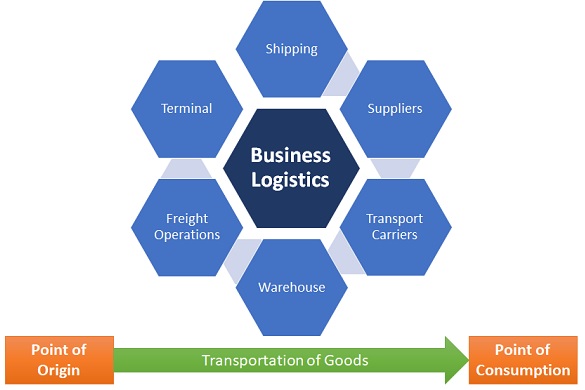Business Logistics - Definition & Importance
What is Business Logistics?
Business logistics is a business planning framework that is concerned with material procurement, materials management and overall inventory control. Business logistics is an activity that takes goods from source to destination location. A business logistics system is considered to be effective if it helps to reduce the carrying and storage costs of inventory and increase profits flow in the organization.
Importance of Business Logistics
Business logistics includes the inbound as well the outbound movement of inventory and supplies. It estimates the demand of the organization, the requirements of the organization for the project in hand, it decides the sources of procurement of material and the method of procurement of materials, it exercises control over the physical movement of inventory between departments and is also concerned with the process of storing the inventory at various stages so as to achieve an optimum level of demand and supply and reduce costs. It is a larger concept than distribution management as it includes the task of forecasting and procurement also. It combines physical distribution and materials management apart from dealing with the process of procurement.
Business logistics comprises of processes like:
1. coordination of project requirements
2. procurement of inventory
3. control over the physical movement of inventory, and
4. Storage of raw materials, semi-finished products and finished goods so that optimum demand supply equilibrium is reached at minimum costs.

Business Logistics Stakeholders
The key stakeholders of business logistics are:
1. Shippers: These are the users or customers who want to use the business logistics services.
2. Suppliers: The companies which provide logistics services based on the goods, services, inventory type volume etc.
3. Transport carriers: The type of transportation which are required to transport the goods i.e. railway, airways, roadways, waterways, pipeline etc.
4. Warehousing: These are stakeholders in the logistics cycle which provide options to store goods in warehouses.
5. Freight forwarders: Companies which plan, schedule, operate & coordinate movement of goods.
6. Terminal operations: These stakeholders in logistics enable operations at docks
Business Logistics Activities
Some of the main activities which are covered in logistics management are:
1. Determining location of plant, factory, warehouses etc.
2. Plan layouts & geography of distribution centers.
3. Selection of transportation mode like air, rail, road, water, pipeline etc.
4. Evaluating shipment volume & which are most cost effective routes
5. Packaging, loading, unloading, distributing goods from source to destination location.
Hence, this concludes the definition of Business Logistics along with its overview.
This article has been researched & authored by the Business Concepts Team. It has been reviewed & published by the MBA Skool Team. The content on MBA Skool has been created for educational & academic purpose only.
Browse the definition and meaning of more similar terms. The Management Dictionary covers over 1800 business concepts from 5 categories.
Continue Reading:
What is MBA Skool?About Us
MBA Skool is a Knowledge Resource for Management Students, Aspirants & Professionals.
Business Courses
Quizzes & Skills
Quizzes test your expertise in business and Skill tests evaluate your management traits
Related Content
All Business Sections
Write for Us